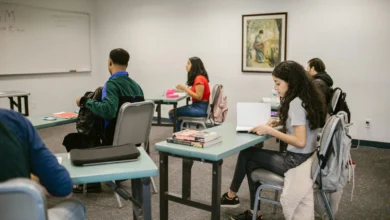Best Study Abroad Programs For U.S. Students In 2025

Best Study Abroad Programs for U.S. Students in 2025 provide an exceptional opportunity for students to broaden their horizons and enrich their academic experiences. These programs allow students to immerse themselves in different cultures, gain global perspectives, and enhance their educational credentials. As the world becomes increasingly interconnected, the importance of studying abroad continues to grow, offering U.S. students numerous advantages in both their personal and professional lives.
The upcoming year promises a variety of exciting destinations and programs tailored to meet the diverse needs of students. From traditional favorites to emerging hotspots, students can expect unique cultural experiences alongside rigorous academic curricula. This guide will explore the most compelling study abroad options available in 2025, covering everything from types of programs and financial considerations to application processes and cultural adaptation strategies.
Overview of Study Abroad Programs
Study abroad programs are structured initiatives allowing U.S. students to pursue academic coursework, internships, or cultural exchange in foreign countries. These programs are designed to enhance educational experiences by providing exposure to diverse cultures, languages, and academic methodologies. The significance of study abroad programs lies in their ability to foster global citizenship, broaden worldviews, and enhance employability prospects for participants.
Participation in study abroad programs offers numerous benefits that can profoundly impact a student’s personal and professional growth. These benefits include improved language skills, increased adaptability, and enhanced intercultural competence. Furthermore, students often report a boost in confidence and independence, as navigating life in a foreign environment requires problem-solving and resilience.
Statistics indicate a growing trend in the number of U.S. students studying abroad. In the 2019-2020 academic year, approximately 400,000 U.S. students participated in study abroad programs, showing a steady increase over the past decade. According to the Institute of International Education’s Open Doors report, the most popular destinations for these students included the United Kingdom, Italy, and Spain, reflecting a strong interest in both English-speaking and culturally rich countries.
Benefits of Participating in Study Abroad Programs
Participating in study abroad programs presents multifaceted advantages that extend beyond mere academic credits. The following points highlight these benefits, illustrating how studying abroad can transform a student’s educational experience and future career prospects:
- Enhanced Academic Opportunities: Students gain access to unique courses and programs that may not be available in their home institutions, enriching their learning experiences.
- Cultural Immersion: Living in a different country allows students to immerse themselves in new cultures, fostering a deeper understanding of global perspectives.
- Language Acquisition: For students studying in non-English speaking countries, the opportunity to learn and practice a new language in real-life contexts significantly improves language proficiency.
- Career Advancement: Employers increasingly value international experience, viewing it as an indicator of adaptability, resourcefulness, and cultural competence.
- Networking Opportunities: Study abroad programs often facilitate connections with local professionals and other international students, creating valuable networks for future career endeavors.
“The world is a book and those who do not travel read only one page.” – Saint Augustine
The influence of studying abroad extends to personal development as well, with students reporting increased self-confidence and independence. Experiencing life in a different cultural context challenges students to step out of their comfort zones, fostering skills that are essential in today’s globalized world. Through these transformative experiences, students not only gain valuable knowledge and skills but also create lasting memories and friendships that transcend borders.
Top Destinations for Study Abroad in 2025
As study abroad programs continue to evolve, 2025 presents exciting opportunities for U.S. students seeking global education experiences. The choice of destination can significantly impact a student’s academic journey and cultural exposure. In this section, we will explore the most popular countries for U.S. students heading abroad in 2025, as well as emerging destinations that are capturing the interest of many.
Popular Countries for U.S. Students
Several countries have consistently ranked among the top choices for U.S. students pursuing study abroad opportunities. These nations offer robust educational systems, rich cultural experiences, and immersive environments conducive to learning. The following countries are expected to be particularly popular in 2025:
- United Kingdom: Renowned for its prestigious universities such as Oxford and Cambridge, the UK remains a top destination. Students benefit from high-quality education and diverse cultural experiences, including historical landmarks and vibrant cities.
- Australia: With institutions like the University of Melbourne and the Australian National University, Australia attracts students for its excellent academic programs and beautiful landscapes. The friendly atmosphere and outdoor lifestyle enhance the overall experience.
- Germany: Known for its strong engineering and technology programs, Germany offers numerous tuition-free or low-cost education opportunities. The country’s cultural heritage and modern innovations provide a unique blend of experiences for students.
- Spain: The allure of Spain lies in its rich history, art, and language immersion programs. Cities like Barcelona and Madrid are popular for their lively environments and comprehensive educational offerings.
- France: Home to some of the world’s finest art and history, France is a top choice for students interested in culture, fashion, and culinary arts. Institutions such as Sciences Po provide high-caliber education in an inspiring setting.
Emerging Destinations Gaining Popularity
In addition to established favorites, several emerging destinations are gaining traction among U.S. students in 2025. These locations offer unique educational experiences and are becoming increasingly accessible for international students. Noteworthy emerging destinations include:
- South Korea: With its booming technology sector and vibrant culture, South Korea is fast becoming a hub for U.S. students. Universities like Seoul National University offer innovative programs alongside a rich cultural heritage.
- Netherlands: Known for its high standard of education and English-taught programs, the Netherlands attracts students interested in international business and sustainability. The country’s picturesque cities and progressive approach to education enhance its appeal.
- New Zealand: Renowned for its natural beauty and quality of life, New Zealand offers unique opportunities in environmental sciences and outdoor education. Institutions such as the University of Auckland are gaining recognition for their academic rigor.
- Argentina: As a rising destination for students seeking language immersion and cultural experiences, Argentina boasts a vibrant atmosphere and offers programs in areas like business and social sciences. The cultural richness of cities like Buenos Aires adds to its allure.
Cultural and Educational Advantages
Each of these top destinations provides distinct cultural and educational advantages that enhance the study abroad experience. The educational systems in these countries often emphasize practical learning, research opportunities, and global perspectives.
“Studying abroad allows students to gain invaluable insights that extend beyond classroom learning, fostering personal growth and intercultural understanding.”
Students also benefit from language immersion, which can significantly improve their communication skills and employability in an increasingly global job market. Furthermore, the diverse cultural landscapes in these countries offer opportunities for personal exploration and lifelong connections with peers from around the world.
Types of Programs Available
Study abroad programs offer diverse opportunities for U.S. students to enhance their educational experience while immersing themselves in different cultures. Understanding the various types of programs can help students choose the most suitable option based on their academic goals, personal interests, and available time.
There are primarily three types of study abroad programs: exchange programs, internships, and volunteer opportunities. Each type caters to different preferences and career aspirations, providing unique experiences. Additionally, study abroad options can be categorized into short-term and long-term programs, impacting the depth and scope of the international experience.
Overview of Program Types
The following table summarizes the key features of the different types of study abroad programs, including their duration, focus, and potential benefits:
| Program Type | Duration | Focus | Key Features |
|---|---|---|---|
| Exchange Programs | 1 semester to 1 year | Academic | Students attend a partner institution abroad, taking courses that typically count towards their degrees. |
| Internships | 8 weeks to 1 year | Professional | Provides hands-on work experience in a global setting, enhancing skills and employability. |
| Volunteer Opportunities | 1 week to 6 months | Social/Community Service | Engagement in community service projects, promoting cultural exchange and personal growth. |
| Short-term Programs | 1 week to 8 weeks | Varied (academic, cultural, or experiential) | Intensive programs focusing on specific subjects or cultural experiences, often during summer or winter breaks. |
| Long-term Programs | 1 semester to 1 year | Academic | Comprehensive immersion into the local culture and education system, allowing deeper engagement. |
“Study abroad programs not only enhance academic knowledge but also foster personal growth and cross-cultural understanding.”
Financial Considerations
Studying abroad is an enriching experience that offers numerous academic and cultural benefits. However, it is essential to understand the financial implications associated with these programs. U.S. students should consider various costs, including tuition, living expenses, and travel, in order to effectively plan their budgets and funding options for 2025.
The costs associated with study abroad programs can vary significantly based on the destination, program type, and duration. Tuition fees alone can range from $10,000 to over $50,000 per semester, depending on the institution and the host country’s academic regulations. In addition to tuition, students should budget for living expenses such as accommodation, meals, transportation, and personal expenses, which can add up to $1,000 to $2,500 per month. Travel costs, including round-trip airfare and local travel, also need to be factored into the overall budget.
Budgeting and Funding Strategies
Budgeting effectively is crucial for managing the costs of studying abroad. Creating a detailed budget can help students track their expenses and identify areas where they can save. Here are some strategies to consider:
- Research the cost of living in your host country. Understanding local prices can help in planning a realistic budget.
- Consider staying in shared accommodation or hostels to reduce housing costs.
- Explore meal plans or cooking for yourself to save on daily food expenses.
- Utilize public transportation rather than taxis to lower travel costs.
In addition to effective budgeting, students can explore various funding options to support their study abroad experience. Scholarships and financial aid can significantly alleviate the financial burden. It is beneficial to apply for scholarships specifically designed for study abroad students, which are often offered by universities, private organizations, and government programs.
Scholarships and Financial Aid Opportunities
Numerous scholarships and financial aid opportunities exist for U.S. students planning to study abroad. These resources can help cover tuition and living costs. Some major scholarship programs include:
- The Benjamin A. Gilman International Scholarship Program, which provides awards for U.S. undergraduate students with financial need to study abroad.
- The Fulbright U.S. Student Program, which offers research, study, and teaching opportunities in over 140 countries around the world.
- The Boren Awards for International Study, which grants scholarships for U.S. students to study in regions critical to U.S. interests, particularly those underrepresented in study abroad programs.
Additionally, many universities provide their own scholarships or financial aid specifically for international study. It is advisable for students to consult their institution’s financial aid office and explore all available options to maximize funding opportunities.
“Proper financial planning is essential for a successful study abroad experience, enabling students to focus on their educational and cultural immersion without undue financial stress.”
Application Processes
The application process for study abroad programs can be intricate and requires careful attention to detail. Understanding each step will help prospective students navigate the path towards an enriching international academic experience. With the right preparation and knowledge of prerequisites, U.S. students can enhance their chances of acceptance into their desired programs.
Each study abroad program has its unique application process, but certain commonalities exist across many institutions. The general steps involved in applying include researching programs, preparing necessary documentation, submitting applications, and attending interviews if required.
Steps Involved in the Application Process
The following steps provide a clear roadmap for students eager to apply for a study abroad program:
1. Research Programs and Destinations: Begin by exploring various study abroad options that align with academic goals, interests, and preferred locations.
2. Consult Academic Advisors: Meet with academic advisors to understand how the study abroad experience will fit into the academic curriculum and degree requirements.
3. Prepare Necessary Documentation: Compile required documents, including academic transcripts, letters of recommendation, a statement of purpose, and a resume or CV.
4. Complete Application Forms: Fill out application forms provided by the program or institution, ensuring all information is accurate and complete.
5. Submit Applications: Adhere to submission deadlines and guidelines, which may include online submissions or physical copies.
6. Interviews and Assessments: Some programs may require interviews or additional assessments to gauge suitability for the program.
7. Acceptance Notifications: Wait for notifications regarding acceptance and further instructions on the next steps.
Necessary Documentation and Prerequisites
U.S. students must prepare specific documentation to support their applications. The following items are commonly required:
– Academic transcripts that reflect previous coursework and grades.
– Letters of recommendation from professors or employers who can speak to the applicant’s qualifications and character.
– A statement of purpose outlining the student’s motivations for studying abroad and how it relates to their academic and career goals.
– A current resume or CV detailing relevant experiences, skills, and extracurricular activities.
It is crucial for students to check individual program requirements, as these documents may vary based on the institution and destination.
Application Checklist for Prospective Students
A comprehensive checklist can help streamline the application process. Below is a useful checklist for students preparing to apply for study abroad programs:
– [ ] Research Study Abroad Programs: Identify programs that match academic interests and personal goals.
– [ ] Meet with an Academic Advisor: Discuss how the program fits into your academic plan.
– [ ] Gather Documentation:
– [ ] Academic transcripts
– [ ] Letters of recommendation
– [ ] Statement of purpose
– [ ] Resume or CV
– [ ] Complete Application Forms: Fill out necessary forms accurately.
– [ ] Prepare for Interviews: Practice responses and gather additional information if interviews are required.
– [ ] Submit Applications by Deadline: Ensure all applications are submitted on time, following guidelines.
– [ ] Follow Up: Confirm receipt of applications and any additional requirements.
By adhering to these steps and utilizing the checklist, students can navigate the application process with greater confidence and efficiency, setting the stage for a successful study abroad experience.
Academic Credit Transfer
Transferring academic credits from study abroad programs back to U.S. institutions is a critical aspect of ensuring that students can effectively integrate their international experiences into their degree pathways. Understanding the process and potential challenges involved in credit transfer is essential for students planning to study abroad in 2025.
The process of transferring academic credits typically begins with a thorough evaluation of the courses taken abroad in relation to the student’s home institution’s curriculum. Many universities require students to seek pre-approval for courses they intend to take while studying abroad. This pre-approval ensures that the courses align with the student’s academic goals and can be recognized for credit upon return.
Importance of Pre-Approval for Courses
Pre-approval of courses is paramount for a seamless credit transfer process. Students must engage with their academic advisors to review the syllabi and course descriptions of intended classes. This preparation not only prevents potential credit transfer issues but also helps in aligning international studies with degree requirements.
Factors that underscore the significance of pre-approval include:
- Alignment with Degree Requirements: Ensures that courses taken abroad contribute toward fulfilling major, minor, or general education requirements.
- Institutional Policies: Most universities have specific guidelines regarding the transferability of credits from external institutions, and pre-approval helps navigate these policies effectively.
- Minimizing Academic Delays: Helps students avoid the risk of extending their time in college due to unrecognized credits.
Common Challenges in Credit Transfer
Students may encounter several challenges when transferring credits from their study abroad programs back to their U.S. institutions. Recognizing these challenges can help students prepare better for their academic journey.
Some of the common challenges include:
- Course Equivalency Issues: Differences in course content and academic rigor can result in courses not being deemed equivalent to those offered domestically.
- Grade Transfer Policies: Some institutions may not accept grades earned abroad, only offering credit for the course without impacting the GPA.
- Documentation Requirements: Institutions often require detailed syllabi, course descriptions, and sometimes even faculty qualifications to recognize credits, which can be challenging to obtain after returning from abroad.
To mitigate these challenges, students can:
- Maintain open communication with their academic advisors throughout the study abroad process.
- Collect all relevant documentation regarding courses taken, including syllabi and transcripts.
- Be proactive in understanding their home institution’s credit transfer policies, including any forms or paperwork needed prior to departure.
“Early planning and proactive communication with academic advisors are key strategies for successful credit transfer.”
Cultural Immersion and Adaptation
Cultural immersion is a vital component of the study abroad experience, allowing students to gain a deeper understanding of the host country and its people. Engaging fully with the local culture enhances personal growth, fosters meaningful connections, and enriches academic learning. To make the most of their time abroad, students should actively seek opportunities to immerse themselves in their new environment.
Strategies for cultural immersion include participating in local events, joining clubs or organizations, and volunteering in community projects. Engaging with local residents not only helps build friendships but also enhances language skills and cultural knowledge. Embracing new experiences can provide valuable insights into different ways of life, making the transition smoother and more enjoyable.
Overcoming Culture Shock and Adapting to New Environments
Culture shock is a common challenge faced by students studying abroad, often manifesting as feelings of disorientation and anxiety when immersed in a new culture. Understanding the stages of culture shock can help students navigate this experience more effectively. The four stages typically include the honeymoon phase, frustration phase, adjustment phase, and acceptance phase.
To overcome culture shock, students can adopt several strategies:
- Maintain an open mind: Embrace new customs, traditions, and perspectives without preconceived judgments.
- Establish a support network: Connect with fellow international students and locals who can offer guidance and companionship.
- Stay engaged: Participate in local activities, attend cultural events, and explore the surroundings to foster a sense of belonging.
- Document experiences: Keeping a journal can provide an outlet for emotions and help students reflect on their journey.
- Practice self-care: Prioritize mental and physical well-being by engaging in familiar activities, such as exercise or meditation.
Students have shared transformative testimonials about their cultural experiences while studying abroad. For instance, Anna, a student who spent a semester in Italy, remarked,
“The moment I learned to cook traditional Italian dishes with my host family, I felt like I was part of their world. It was more than just academics; it was about living the culture.”
Similarly, Mark, who studied in Japan, stated,
“Attending local festivals and making friends with Japanese students helped me appreciate the nuances of their culture. It was a lesson in humility and respect.”
Such testimonies underscore the impact of cultural immersion on personal development and adaptability, demonstrating the rich experiences awaiting students willing to embrace new cultures.
Health and Safety Considerations
Studying abroad can be an exhilarating experience, but it also comes with unique health and safety challenges that U.S. students must navigate. Prioritizing health and safety is paramount to ensure a fulfilling study abroad journey. Students should be proactive in understanding the health landscape of their host country and how to stay safe while immersing themselves in a new culture.
Students should be aware of essential health precautions and the critical role of travel insurance in safeguarding their well-being abroad. Ensuring that necessary vaccinations are up to date and being informed about local health services can significantly reduce health risks while studying overseas.
Health and Safety Tips for U.S. Students
To maintain health and safety while studying abroad, students should consider the following tips:
1. Stay Informed About Local Health Risks: Research common illnesses in the host country and their prevention methods. For example, tropical countries may require vaccines for diseases like Yellow Fever.
2. Access to Medical Services: Identify local hospitals or clinics in your area and ensure you have access to a healthcare professional if needed.
3. Maintain Personal Hygiene: Regular handwashing and carrying sanitizing gel can help prevent the spread of illnesses.
4. Emergency Contacts: Keep a list of local emergency numbers and the contact details of the nearest U.S. embassy or consulate.
5. Trust Your Instincts: If a situation feels unsafe, trust your judgment and remove yourself from it.
“Prevention is better than cure.”
Importance of Travel Insurance, Best Study Abroad Programs for U.S. Students in 2025
Travel insurance is a fundamental aspect of preparing for a study abroad experience. It provides coverage for unexpected situations, such as medical emergencies or trip cancellations. Before traveling, students should ensure their insurance includes the following benefits:
– Medical Coverage: Adequate health insurance that covers both routine and emergency medical care.
– Evacuation Coverage: This insurance can cover costs if students need to be evacuated due to political unrest or natural disasters.
– Trip Cancellation: Protection against financial losses if a trip must be canceled due to unforeseen circumstances.
Resources for Staying Informed About Safety While Abroad
Staying informed is essential for ensuring safety during a study abroad program. The following resources can provide valuable information and support:
– U.S. State Department Travel Advisories: Offers up-to-date information on safety conditions and travel warnings for specific countries.
– Centers for Disease Control and Prevention (CDC): Provides health-related travel advisories, including vaccination recommendations and disease outbreaks.
– Local News Outlets: Keeping an eye on local news can help students stay aware of any emerging safety issues or events in their area.
– University Study Abroad Office: Most universities have dedicated offices that offer resources and support for students studying abroad, including safety briefings and documentation.
Implementing these health and safety considerations will empower students to enjoy their study abroad experience while minimizing risks associated with living in a foreign country.
Networking Opportunities
Studying abroad not only enriches academic knowledge but also plays a pivotal role in enhancing professional networking opportunities. Participation in international programs can open doors to a wealth of connections that can significantly benefit a student’s career trajectory. Networking while studying abroad can lead to both personal growth and professional advancements, setting students on a path toward success in their chosen fields.
Engaging in study abroad programs allows students to form relationships with peers, professors, and industry professionals from diverse cultural backgrounds. These connections can lead to collaborative projects, mentorship opportunities, and insights into global job markets. The international exposure gained through study abroad experiences enables students to build a robust professional network that extends beyond borders.
Internships and Job Placements
Internships and job placements are integral components that can arise from study abroad experiences. Many institutions offer programs that facilitate internships in the host country, providing students with practical experience in their field of study. This professional exposure not only enhances their resumes but also builds a vital network within the industry.
The following points illustrate the significance of internships and job placements resulting from study abroad experiences:
- Access to International Job Markets: Students who participate in study abroad programs often gain insights into local job markets, which can be invaluable when seeking employment after graduation.
- Skill Development: Internships abroad allow students to develop essential skills, such as cross-cultural communication and adaptability, which are highly valued by employers.
- Enhanced Employability: Graduates with international experience are often more competitive in the job market due to their unique perspectives and global understanding.
- Job Referrals: Networking with professionals during internships can lead to job referrals and recommendations, significantly increasing the chances of securing employment.
“Networking through study abroad not only opens doors, but also creates pathways for opportunities that may not have been accessible otherwise.”
Success Stories of Career Advancement
Numerous students have leveraged their study abroad experiences to enhance their career trajectories. These stories exemplify the impactful connections made during international study programs.
One notable example involves a student who, during her semester in London, secured an internship at a leading marketing agency. Through her internship, she not only gained hands-on experience but also built a network of professionals in the industry. Upon returning to the U.S., she received multiple job offers, one of which came directly from a contact she made during her internship.
Another example features a student who participated in a study abroad program in Japan. During this time, he connected with local tech startups and later received a job offer from one of them after showcasing his skills in a project competition. His international experience and the network he built were pivotal in launching his career in technology.
These success stories affirm the immense potential that study abroad programs hold in fostering professional networking opportunities and advancing career goals.
Alumni Experiences and Testimonials: Best Study Abroad Programs For U.S. Students In 2025
The experiences of alumni who have participated in study abroad programs provide invaluable insights into the transformative power of these opportunities. Their stories highlight not only the academic and professional gains they achieved but also the personal growth and cultural awareness they experienced during their time abroad. These testimonials serve as compelling evidence of the profound impact that studying in a foreign country can have on a student’s life.
Past participants of study abroad programs often express how their experiences shaped their future trajectories. Many alumni report significant shifts in their perspectives, confidence levels, and career aspirations as a result of their international education. The following accounts illustrate the diverse ways in which these programs have enriched their lives.
Influential Alumni Testimonials
The voices of alumni provide a rich tapestry of experiences. Here are a few notable testimonials that encapsulate the transformative nature of study abroad programs:
“Studying in Spain not only improved my language skills but also opened my eyes to different ways of thinking and living. I returned with a newfound appreciation for cultural diversity.” – Maria Gonzalez, University of California, Berkeley
“The internship I completed in Japan during my study abroad was a game changer. It helped me land a job at a top firm after graduation, and the experience taught me the importance of adaptability in professional settings.” – James Lee, University of Florida
“Living in Italy changed my outlook on life. I learned to embrace uncertainty and developed friendships that continue to enrich my life even years later.” – Emily Chen, New York University
These testimonials reflect not only individual growth but also the lasting connections and skills developed through international experiences. Alumni frequently emphasize the importance of cultural immersion and the unique opportunities for personal development that studying abroad facilitates. As they navigate new environments, they often find resilience and adaptability, traits that prove invaluable in their personal and professional lives.
Many alumni also report that their study abroad experiences have significantly influenced their career paths. The international exposure, networking opportunities, and skills gained are frequently cited as pivotal elements that distinguish them in competitive job markets. The insights shared by former students serve as powerful reminders of the enduring benefits that these programs offer.
Closing Notes
In conclusion, Best Study Abroad Programs for U.S. Students in 2025 not only facilitate academic and cultural enrichment but also contribute to personal growth and career development. As students embark on these transformative journeys, they will gain invaluable experiences that shape their futures and broaden their worldviews. With thorough preparation and a proactive approach, any student can make the most of their study abroad adventure, paving the way for both academic success and lifelong memories.
Commonly Asked Questions
What are the requirements to study abroad?
Requirements generally include a good academic standing, a completed application, and sometimes language proficiency. Specific requirements vary by program and destination.
How long can I study abroad?
Study abroad programs can range from a few weeks for summer sessions to a full academic year, depending on the program type and student preferences.
Will I receive academic credit for my study abroad program?
Yes, most study abroad programs offer academic credit that can be transferred back to your home institution. It’s important to seek pre-approval for courses to ensure credit transferability.
Can I work while studying abroad?
Working while studying abroad may be possible, but regulations vary by country. Students should check visa requirements and local labor laws before pursuing employment.
What should I do in case of an emergency while abroad?
In case of an emergency, students should contact their program coordinator, local authorities, and their home institution. Having travel insurance is also advisable for emergencies.






